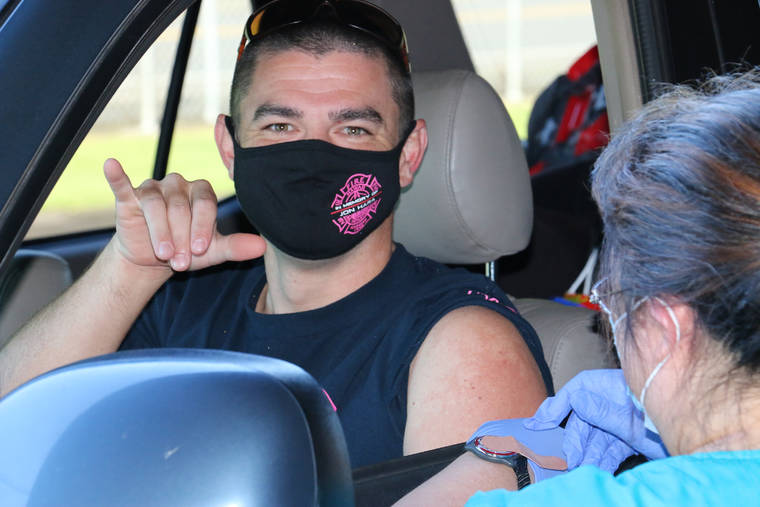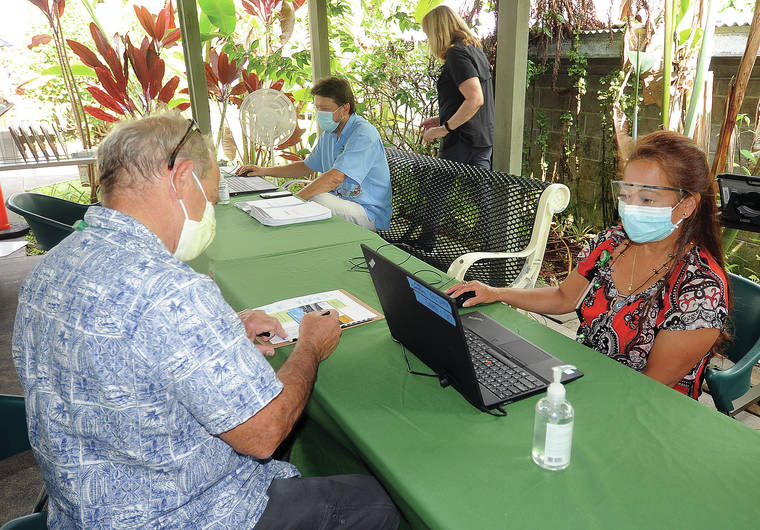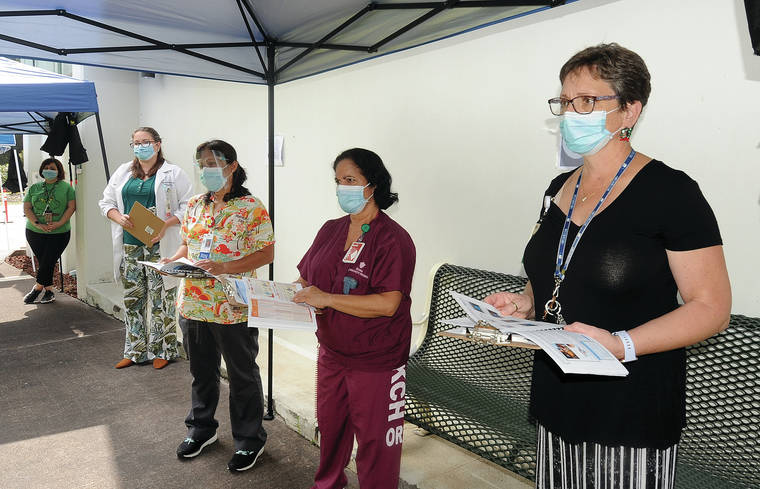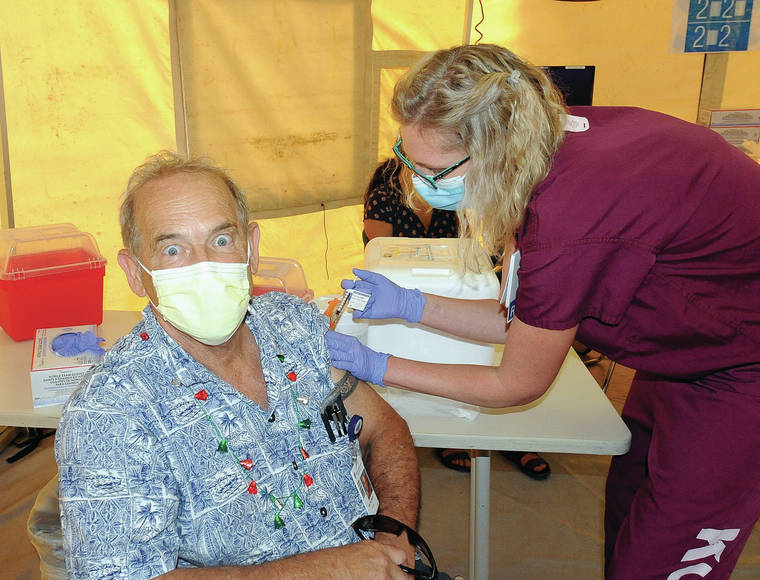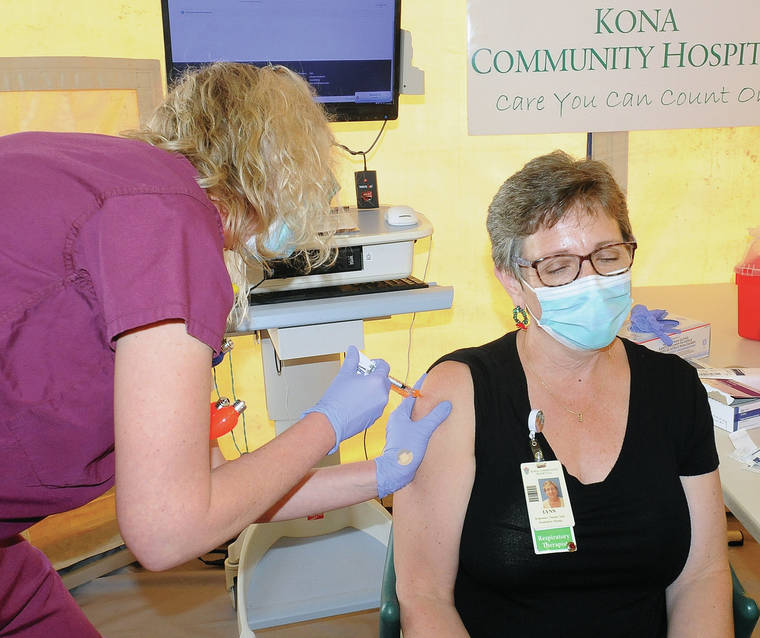The first 25 frontline workers at Kona Community Hospital received their initial dose of the COVID-19 vaccine Wednesday afternoon in Kealakekua.
“This is a historic moment at Kona Community Hospital,” said Dr. Vivian Chang, Chief of Surgery, some 273 days after the first stay-at-home order was implemented in Hawaii.. “It’s the beginning of the end of the virus.”
The first group of employees was escorted into a registration area where their information was verified in the Vaccine Administration Management System (VAMS), a nationwide program developed by the Centers for Disease Control and Prevention. The CDC has mandated all vaccine sites use the system for data collection and tracking.
After registration, the group was given a brief tutorial on the vaccination before proceeding to the acute care module tent set up outside of the hospital.
Respiratory Therapist Supervisor Lynn Reinert was the first employee to receive the shot.
“I’m excited. We have taken care of a lot of people who succumbed to COVID,” she said, relaying how horrible the virus can be. “I have to take care of myself, my family and my community.”
She had no safety concerns about taking the vaccine.
“I would take the risk of the vaccine rather than the illness,” she said.
After receiving the vaccination, staff was ushered into a waiting area to make sure they did not have any adverse effects to the shot. The CDC will follow up with vaccine recipients to track any side effects they may encounter.
The Hawaii Health Systems Corporation West Hawaii Region includes Kona Community Hospital, Kohala Hospital, Alii Health Center and Kona Ambulatory Surgery Center and employs approximately 700 workers. About 500 of those employees work at the Kona hospital.
“We are strongly encouraging all of our staff to take the vaccine,” said Judy Donovan, KCH marketing and strategic planning director, noting the vaccination is voluntary at this time.
She said the region anticipates initially about 60% of the employees will take the vaccine. Registered community providers on the island will also be able to receive the vaccine at the hospital.
HHSC Regional CEO Jim Lee said the shipment of 975 vaccines arrived Monday.
“We have been waiting for the vaccine for weeks. We are very excited to get it,” he said adding the Pfizer vaccine is being stored and dosed at the hospital pharmacy.
Donovan said an additional 975 doses will automatically be shipped when it is time to administer the second dose three weeks later.
Even though KCH only vaccinated 25 employees Wednesday, Donovan expects that daily number to grow once the functionality of the system is evaluated.
Lee said he is hopeful that everyone on the island will have the opportunity to be vaccinated by spring.
“It would behoove everyone in the community to consider taking it. It is the best way to take care of yourself, your family and your community along with wearing masks, social distancing and avoiding gatherings,” said Lee.
Dr. Alistair Bairos, Interim Chief Medical Officer, rolled up his sleeve to get his shot.
“It’s a stupendous event for the hospital, the country and the entire planet,” said Bairos. “There has never been a vaccine development like this before. We’re all in this together and we are all going to get out of this together.”
Also Wednesday, Hawaii County first responders received their first round of COVID-19 vaccinations at the Afook-Chinen Civic Auditorium in Hilo. The vaccination was administered by the state Department of Health in collaboration with the county. An estimated 200 first responders received a vaccination.
Vaccinations were administered via a two-lane drive-through to adhere to county and state social distancing orders and mandates. A second round of first responder vaccinations is planned for the Kona District today.
“It is a relief to know that we are doing all we can to better protect our first responders from the threat of COVID-19,” said Mayor Mitch Roth. “The bravery and honor that they have exhibited over the course of the past year has been a true testament to their commitment of ensuring the health and safety of our community. Although there will be a follow-up booster shot required before the vaccine is considered fully administered, this is a phenomenal first step in protecting our communities and ridding our county, our state, and our country of the virus once and for all.”
Hilo Medical Center also began vaccinating staff, as well. The East Hawaii facility expected to vaccinate at least 150 employees on the first day.
Wednesday’s inoculations follow the Queen’s North Hawaii Community Hospital in Waimea administering the first round of Pfizer’s COVID-19 vaccine to 30 staff members on Tuesday. The hospital received 490 doses of the vaccine Monday with additional doses expected to arrive next week.
According to the Hawaii COVID-19 Vaccination Plan, 883,600 people in Hawaii would be vaccinated during the first three stages followed by anyone who did not have access during previous allocation stages.
The first stage which includes two phases, covers high-risk health workers and first-responders followed by people with comorbidities and underlying health conditions that put them at high risk and adults over age 65 living in “overcrowded settings.” It’s estimated 121,000 will be vaccinated during stage one.
Stage two includes K-12 teachers and school staff; critical risk workers; people with comorbidities and underlying health conditions that put them at moderately high risk; people in homeless shelters or group homes; incarcerated individuals and staff at incarceration facilities; and all adults over age 65. An estimated 450,000 people would be vaccinated during stage two.
In the third stage, an additional 403,000 people would be vaccinated, including young adults between age 18 and 24 and children up to age 17 and workers in industries and occupations not included in earlier stages.
The fourth stage would work to vaccinate an undetermined number of Hawaii residents who did not have access to or receive a vaccination during the earlier stages.






